深圳牛津版九年级(下) 课文 (带翻译)
2019-2020学年广州深圳牛津版九年级下册 Unit 2 Culture shock 课文同步训练(含答案)

九年级下册 Unit 2 Culture shock词汇和搭配一、首字母填空1. Excuse me, do you have a s___________ moment? I have something to talk to you.2. If you don't study hard, you will f___________ the exam.3. Thanks very much, but I think I can m___________ to solve the problem.4. Every middle school student needs to wear school u___________ when they are at school.5. The thief a___________ stealing the vase.6. Alaska is the biggest s___________ in the USA.7. Tom spent all his time with his family at home during the Christmas v___________.8. I am afraid I can't go shopping with you because my s___________ is full.9. Have you ever heard of the English i___________ under the weather?10. Do you know which of these is the n___________ flag of Brazil?二、完成句子1.很快,他就适应了广州的生活。
Soon, he ___________ ___________ ___________ the life in Guangzhou.2.你喝茶也行,喝咖啡也可以。
九年级(初三)英语课文翻译大全

本⽂是由编辑为您准备的《九年级(初三)英语课⽂翻译⼤全》请⼤家参考!初三英语课⽂翻译 88页3a 他们都在商场 放学后,很多学⽣都去商场。
我们决定和学⽣谈谈为什么他们去那⼉ 记者:为什么你们去商场? 余悦:我去市场因为我的朋友在那⼉闲逛。
但是我真的不喜欢那⼉。
记者:哦,为什么? 余悦:空⽓不新鲜。
我更喜欢在外⾯。
⽽且,商场通常很拥挤。
记者:你呢? 李军:哦,我喜爱商场。
那⼉总是有偶然的事。
那⼉有很多免费的⾳乐会。
⽽且,观看⼈们也很有趣。
胡鹏:我也喜欢商场。
我喜欢去有⾳乐的商店听CD。
我也喜欢看书店的书 余悦:当我⾛进商场我总是花很多的钱 初三英语课⽂翻译 90页3a 吃,获得乐趣并且在⽔镇学会 少年将想要参观世界' s的⽔滑道和吃在鲍伯'伯⽗; s ⼀个不同的摇滚乐队使⽤在鲍伯'伯⽗; 每晚s。
孩⼦将享⽤城市饮⾷摊.在那⾥组织了⽐赛的⼩丑,并且职员装饰作为⼩丑。
那⾥' 很多也s⽗母的在⽔镇。
如果他们爱好⾷物,他们可以找到它在农夫' s市场⾷物是可⼝的和便宜地的地⽅。
当孩⼦获得乐趣时,⽗母能采取在海滩的舞蹈课。
并且⼤家可能学会某事在⽔镇.在那⾥是三个博物馆! 少年爱体育博物馆,并且孩⼦享⽤科技馆。
将度过许多快乐时光⾛通过历史博物馆的⽗母。
初三英语课⽂翻译 98页3a 亲爱的劳拉: 感谢你的来信。
是的,我在法国的交流项⽬很愉快。
甚⾄⽐我想象中的好很多。
在我去之前我还有⼀些担⼼,但是现在完全不会了。
接待我的家庭⼗分友好。
他们⽤⾃⼰的⽅式让我感到如家般的感觉。
你会不敢相信我的法语进步的有多快!我现在能⼗分⾃在的讲法语。
虽然我还是会犯⼀些错误,但这些并不影响我法语的应⽤。
我的挑战是如何在餐桌上表现。
正如你所想的,这些礼仪和我们家乡的⼗分不同。
例如,你不能把⾯包放在餐盘上。
你应该把⾯包放在餐桌上!⼀开始我觉得这样做⼗分奇怪,但现在我已经习惯了。
还有你不能直接⽤⼿来吃出了⾯包的任何东西,甚⾄是⽔果也不可以!(你必须将⽔果切好然后使⽤叉⼦来吃。
2024年牛津深圳版英语初中全册课文翻译句子

初中英语课文句子翻译目录七上U1~U2 (3)七上U3~U4 (4)七上U5~U6 (5)七上U7~U8 (6)七下U1~U2 (7)七下U3~U4 (8)七下U5~U6 (9)七下U7~U8 (10)八上U1~U2 (11)八上U3~U4 (12)八上U5~U6 (13)八上U7~U8 (14)八下U1~U2 (15)八下U3~U4 (16)八下U5~U6 (17)八下U7~U8 (18)九上U1~U2 (19)九上U3~U4 (20)九上U5~U6 (21)九上U7~U8 (22)九下U1~U2 (23)九下U3~U4 (24)九下U5~U6 (25)1.我的梦想是成为一名工程师。
(dream)2.我擅长游泳和打篮球。
(be good at)3.我愿意与来自世界各地的年轻人交朋友。
(would like to;make friends with)4.我和家人住在山下的房子里。
(live with...;close to...)5.我喜欢在空闲时间放风筝。
(in my free time)6.我是一名初中生。
我喜欢上学。
(junior high school;love)7.我家离我的学校很近,所以我经常走路上学。
(close to; on foot)8.我喜欢了解世界的不同地方。
(enjoy;learn about)9.我经常在学校过得很开心。
(have a good time)10.他们把日记看作朋友。
(think of...as...)11.我昨天收到了来自德国朋友的来信。
(hear from)12.我会尽我所能站在她身边。
(close to)13.我的梦想是环游世界。
(dream)14.他想要什么都擅长,但那是不可能的。
(be good at)15.如果我是老师,我会和学生们成为好朋友。
(make friends with)16.我想要走路去深圳湾公园。
(on foot)17.我享受学习中国历史和传统文化。
资料《Unit2课文原文与翻译(素材)译林版九年级英语下册》

译林版九年级下册英语课文及翻译UNIT 2英中对照版UNIT2Comic strip1. Who do you think is the greatest person in history,Eddie?埃迪,你认为史上最伟大的人是谁?2. I think it’s Paul Yum.我认为是保罗•亚姆。
3. Paul Yum? I’ve never heard of him.Who’s he?保罗•亚姆?我从没听说过他。
他是谁?4. He’s an inventor.He invented my favourite food.他是一位发明家。
他发明了我最喜爱的食物。
九下· p21-23ReadingThe first man to walk on the MoonNeil Armstrong(1930 – 2012)was the first man to walk on the Moon. Simon is now reading an article about the astronaut and his space travel. Here is the article.尼尔。
阿姆斯特朗(1930-2012)是首位漫步月球的人。
西蒙现在正在阅读一篇关于这位宇航员和他的太空旅行的文章。
这是那篇文章。
NEIL ARMSTRONG尼尔•阿姆斯特朗Neil Armstrong was born on 5 August 1930 in Ohio,the USA. He became interestedin flying when he took his first flight at the age of six, He received his student pilot’s licence when he was 16.尼尔•阿姆斯特朗于1930年8月5日出生于美国俄亥俄州。
在他6岁参加第一次飞行时,他就开始对飞行感兴趣。
九年级英语 课文与翻译(1-12课) 深圳宝安中学
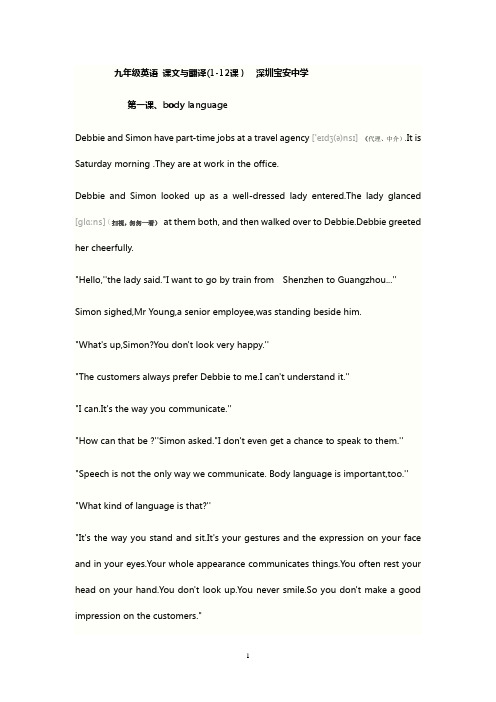
九年级英语课文与翻译(1-12课)深圳宝安中学第一课、body languageDebbie and Simon have part-time jobs at a travel agency['eɪdʒ(ə)nsɪ](代理、中介).It is Saturday morning .They are at work in the office.Debbie and Simon looked up as a well-dressed lady entered.The lady glanced [glɑːns](扫视,匆匆一看)at them both, and then walked over to Debbie.Debbie greeted her cheerfully."Hello,''the lady said."I want to go by train from Shenzhen to Guangzhou...'' Simon sighed,Mr Young,a senior employee,was standing beside him."What's up,Simon?You don't look very happy.''"The customers always prefer Debbie to me.I can't understand it.''"I can.It's the way you communicate.''"How can that be ?''Simon asked."I don't even get a chance to speak to them.'' "Speech is not the only way we communicate. Body language is important,too.'' "What kind of language is that?''"It's the way you stand and sit.It's your gestures and the expression on your face and in your eyes.Your whole appearance communicates things.You often rest your head on your hand.You don't look up.You never smile.So you don't make a good impression on the customers.""but look at Debbie.she’s holding her head up.She makes eye contact with the customers.She smiles.That's why the customers go to her and not to you."After that,Simon decided to improve his body language.He sat up and smiled at the customers .Minutes later,a beautiful girl entered.She looked at Debbie and then at Simon.Without hesitation,she went to Simon and gave him a big smile.A few momentslater,she left happily.Mr Young came over at once and said,"You made a good impression on her." "that was my sister,"Simon said."She came to remind me that tommorow is her birthday. and she wanted to have lunch with me "全文翻译:Debbie 和Simon在一家旅行公司做兼职,现在是周六早上,他们坐在办公室里。
(待分)2014新译林牛津英语9au1u4课文翻译
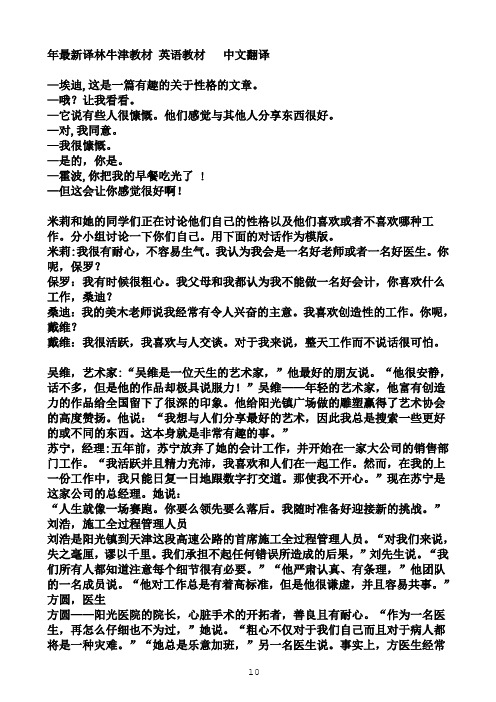
年最新译林牛津教材英语教材中文翻译—埃迪,这是一篇有趣的关于性格的文章。
—哦?让我看看。
—它说有些人很慷慨。
他们感觉与其他人分享东西很好。
—对,我同意。
—我很慷慨。
—是的,你是。
—霍波,你把我的早餐吃光了 !—但这会让你感觉很好啊!米莉和她的同学们正在讨论他们自己的性格以及他们喜欢或者不喜欢哪种工作。
分小组讨论一下你们自己。
用下面的对话作为模版。
米莉:我很有耐心,不容易生气。
我认为我会是一名好老师或者一名好医生。
你呢,保罗?保罗:我有时候很粗心。
我父母和我都认为我不能做一名好会计,你喜欢什么工作,桑迪?桑迪:我的美木老师说我经常有令人兴奋的主意。
我喜欢创造性的工作。
你呢,戴维?戴维:我很活跃,我喜欢与人交谈。
对于我来说,整天工作而不说话很可怕。
吴维,艺术家:“吴维是一位天生的艺术家,”他最好的朋友说。
“他很安静,话不多,但是他的作品却极具说服力!”吴维——年轻的艺术家,他富有创造力的作品给全国留下了很深的印象。
他给阳光镇广场做的雕塑赢得了艺术协会的高度赞扬。
他说:“我想与人们分享最好的艺术,因此我总是搜索一些更好的或不同的东西。
这本身就是非常有趣的事。
”苏宁,经理:五年前,苏宁放弃了她的会计工作,并开始在一家大公司的销售部门工作。
“我活跃并且精力充沛,我喜欢和人们在一起工作。
然而,在我的上一份工作中,我只能日复一日地跟数字打交道。
那使我不开心。
”现在苏宁是这家公司的总经理。
她说:“人生就像一场赛跑。
你要么领先要么落后。
我随时准备好迎接新的挑战。
”刘浩,施工全过程管理人员刘浩是阳光镇到天津这段高速公路的首席施工全过程管理人员。
“对我们来说,失之毫厘,谬以千里。
我们承担不起任何错误所造成的后果,”刘先生说。
“我们所有人都知道注意每个细节很有必要。
”“他严肃认真、有条理,”他团队的一名成员说。
“他对工作总是有着高标准,但是他很谦虚,并且容易共事。
”方圆,医生方圆——阳光医院的院长,心脏手术的开拓者,善良且有耐心。
深圳牛津版九年级(下) 课文 (带翻译)
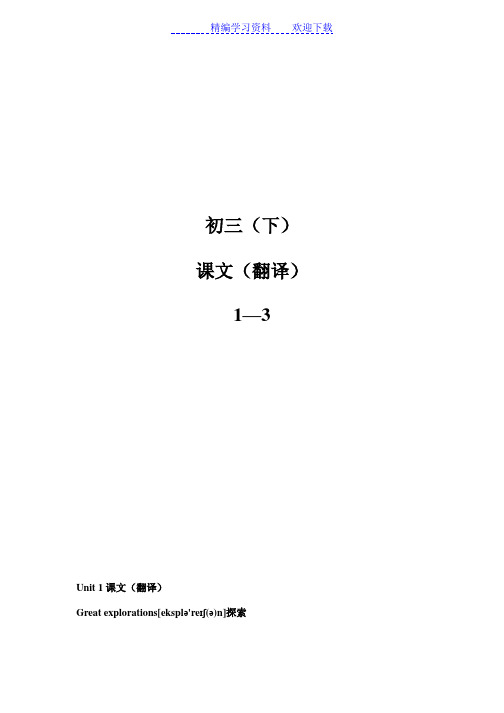
初三(下)课文(翻译)1—3Unit 1 课文(翻译)Great explorations[eksplə'reɪʃ(ə)n]探索郑和下西洋The voyages ['vɒɪɪdʒ] 航行of Zheng He郑和是中国著名的探险家。
1405,他发起了中国七大航海史上的第一次。
这比哥伦布第一次航行发现美洲新大陆早了近一个世纪。
他的旅行是如此重要,人们至今仍然研究。
Zheng He was a famous Chinese explorer. In 1404, he set off出发from China on the first of seven great voyages ['vɒɪɪdʒ] 航行. This was nearly['nɪəlɪ]差不多a century ['sentʃʊrɪ]世纪before Christopher['krɪstəfə(r)] Columbus[kə'lʌmbəs] first set sail启航on his journey['dʒɜːnɪ]旅途 of discovery[dɪ'skʌv(ə)rɪ]发现 to America. His travels were so important that they are still studied today.郑和 1371 出生于云南,后来成为明朝永乐皇帝可信任的官员。
皇帝下令郑造访并探索中国以外的土地,他的任务是发展关系,建立与国外贸易通道。
Zheng He was born in Yunnan in 1371. He rose to 升迁;上升到become a trusted受信任的official [ə'fɪʃ(ə)l]官员of the Yongle Emperor['emp(ə)rə]皇帝of the Ming Dynasty['daɪnəsti]朝代. The emperor ordered Zheng He to visit and explore[ɪk'splɔː; ek-]探索the lands outside China. His task[tɑːsk]任务was to develop relations[dɪ'veləp]发展关系 and set up建立trade[treɪd]贸易 routes[ruːt]路线;航线with foreign countries.在短短几年内,他建造船舶组成了一支庞大的舰队,是当时世界上最大的。
牛津深圳版九年级上英语课文翻译(带翻译)
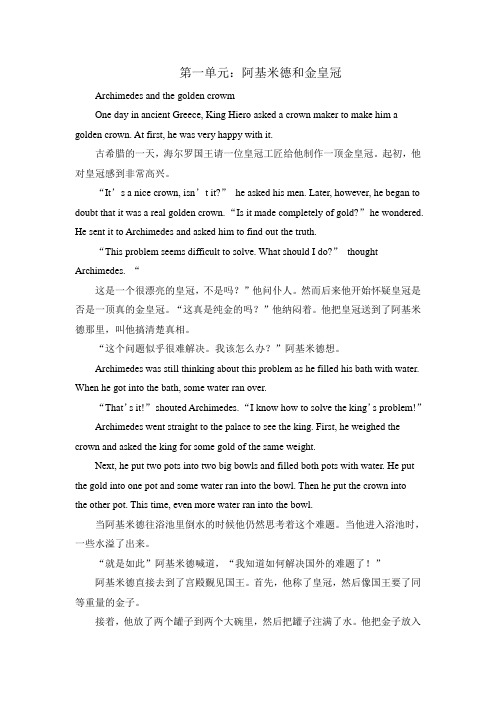
第一单元:阿基米德和金皇冠Archimedes and the golden crowmOne day in ancient Greece, King Hiero asked a crown maker to make him a golden crown. At first, he was very happy with it.古希腊的一天,海尔罗国王请一位皇冠工匠给他制作一顶金皇冠。
起初,他对皇冠感到非常高兴。
“It’s a nice crown, isn’t it?”he asked his men. Later, however, he began to doubt that it was a real golden crown. “Is it made completely of gold?”he wondered. He sent it to Archimedes and asked him to find out the truth.“This problem seems difficult to solve. What should I do?”thought Archimedes. “这是一个很漂亮的皇冠,不是吗?”他问仆人。
然而后来他开始怀疑皇冠是否是一顶真的金皇冠。
“这真是纯金的吗?”他纳闷着。
他把皇冠送到了阿基米德那里,叫他搞清楚真相。
“这个问题似乎很难解决。
我该怎么办?”阿基米德想。
Archimedes was still thinking about this problem as he filled his bath with water. When he got into the bath, some water ran over.“That’s it!”shouted Archimedes. “I know how to solve the king’s problem!”Archimedes went straight to the palace to see the king. First, he weighed the crown and asked the king for some gold of the same weight.Next, he put two pots into two big bowls and filled both pots with water. He put the gold into one pot and some water ran into the bowl. Then he put the crown into the other pot. This time, even more water ran into the bowl.当阿基米德往浴池里倒水的时候他仍然思考着这个难题。
资料《Unit1课文原文与翻译(素材)译林版九年级英语下册》

译林版九年级下册英语课文及翻译UNIT 1英中对照版UNIT1Comic strip1. Wow,the Great Wall is amazing,isn’t it?哇!长城真壮观啊,不是吗?2. No,it isn’t.It’s tiring to climb the steps and my feet hurt.I’m taking a rest.不,才不是呢!爬这些台阶真累人,而且我的脚也磨疼了。
我要休息一下。
3. No,Eddie! There’s still a long way to go. We’d better keep moving不,埃迪!还有很长一段路要走。
我们最好继续前进。
4. I don’t want to go on,Hobo. Wake me up on your way back.我不想继续(走)了,霍波。
在你回来的途中叫醒我。
九下· p7Welcome to the unitKevin a British exchange student,is asking Millie for suggestions on his travel plan.Work in pairs and give your own ideas about it.Use the conversation below as a model.凯文一名英国交换生,正在向米莉征求有关他旅行计划的建议。
两人一组活动,就这件事给出你自己的观点。
用下面的对话作为范例。
Kevin:I’m planning to travel around China.Where shall I visit first,Millie? 凯文:我打算环游中国。
米莉,我首先应该参观哪里呢?Millie:Since you’re in Beijing now,why don’t you start from here?Tian’anmen Square,the Palace Museum and the Great Wall are wonderful places to go.米莉:由于你现在就在北京,为什么不从这里开始呢?天安门广场、故宫博物院和长城都是很好的去处。
(精品)最新外研版九年级英语下册课文翻译

最新外研版九年级下册全册课译文(其8个模块)Module 1 Travel Unit 1 We toured the city by bus and by taxi3.Listen and read. Now complete the table.玲玲:欢迎大家回来!贝蒂:嗨, 玲玲! 假期过得怎么样?玲玲:不错! 我去河南看望了我的祖父母。
当时火车上全都是人,我不得不站了3个多小时。
贝蒂:真不走运啊。
为什么春节出行这么困难呢?玲玲:噢,因为春节的缘故,这段时间成了交通最繁忙的时候。
托尼呢?大明:他回英国和家人团聚去了。
他今天坐飞机回来,但是航班晚点了。
贝蒂:大明,你去了哪里?大明:我们坐飞机直飞香港——飞机出发时也晚点了,不过飞行员成功地按时着陆了。
然后我们乘船去了大屿山和迪斯尼乐园。
真好玩!玲玲:你呢,贝蒂?贝蒂:我们在北京玩得很开心。
我们坐公交车和出租车在城市里游玩。
上周末我们坐客车去了颐和园,还沿湖走了一段很长的路。
玲玲:听起来不错!但是这会儿我们还是最好回去学习吧…期末还有一场大考试呢。
贝蒂:只要你努力,就没什么好担心的。
大明:考试之后就是毕业晚会了。
我们都盼着呢!贝蒂:没错!我们会玩得很开心的!Unit 2 It’s a long story . 2.Read the play and number the expressions in Activity 1 in the order they appear. (李林和李薇在车站站台上告别。
)李林:告诉爸爸妈妈我会想他们的……我也会想念你们所有人。
李薇:我们也会想你的。
李林:春节见。
李薇:保重。
再见!(李林上了车,寻找他的座位。
)李林:对不起,先生。
恐怕你坐了我的座位。
长者:对不起,年轻人。
你说什么?我听不大清楚。
李林:你坐错位置了。
长者:真的吗?但是……我以为这是我的座位呢。
我的票呢?(长者在口袋里、包里,最后又在钱包里翻找他的车票。
牛津深圳版(广州沈阳通用)八年级英语上册课文翻译

牛津深圳版(广州沈阳通用)八年级英语上册课文翻译Dinosaurs are a group of reptiles that lived on Earth for over 60 n years before XXX of the world and came in different sizes。
Some were as tiny as chickens。
XXX。
XXX flying.Dinosaurs lived on Earth over 60 n years ago。
inhabiting us ns of the。
Some were as small as chickens while others were as large as ten elephants and some could even fly.While many dinosaurs were herbivores。
XXX.Dinosaurs lived on Earth for over 150 n years before XXX remains unknown。
but we can learn about them through their fossils.Once upon a time in India。
there was a king who loved playing chess。
One day。
a wise old man came to his kingdom and the king challenged him to a game。
promising the old man any prize he desired if he won。
The old man requested one grainof rice for the first square of the chessboard。
two for the second。
深圳牛津版最新九年级初三(下 课文 (带翻译

初三(下)课文(翻译)1—3Unit 1 课文(翻译)Great explorations[ekspl?'re??(?)n]探索郑和下西洋每次航次结束,郑和返回时都带回在中国从没见过的很多东西,譬如来自非洲的长颈鹿。
除了发展贸易,航行也带动了文化和技术的交流,帮助了这些国家和地区的发展。
At the end of each voyage, Zheng He returned with many things that were seen in China for the first time, such as a giraffe[d??'rɑ:f]长颈鹿 from Africa['?fr?k?]非洲. Besides[b?'sa?dz]除了 developing trade发展贸易, the voyages also encouraged[?n'k?r?d?; en-]鼓励 the exchange[?ks't?end?]交换 of cultures['k?lt??]文化 and technologies[tek'n?l?d??]技术. They helped the development[d?'vel?pm(?)nt]发展 of thosecountries and regions['ri?d?(?)n]地区.1433 年,郑和在他最后一次航行中去世了。
然而,他的航行成就是如此巨大,人们仍然铭记他,视他为开拓世界各地不同民族之间文化交流的先驱。
Zheng He died in 1433 during his last voyage['v???d?]航行. However, his voyages were such a huge achievement [?'t?i?vm(?)nt]成就that people still remember him as a pioneer[pa??'n??]先锋 in opening up开创cultural ['k?lt?(?)r(?)l] 文化的contacts['k?nt?kt]接触;联系 between different peoples around练习 it in错过the History lesson today. Can you tell me what you learnt, please?当然可以,我们学了郑和他的航行。
九年级下册《唐雎不辱使命》课文原文及翻译
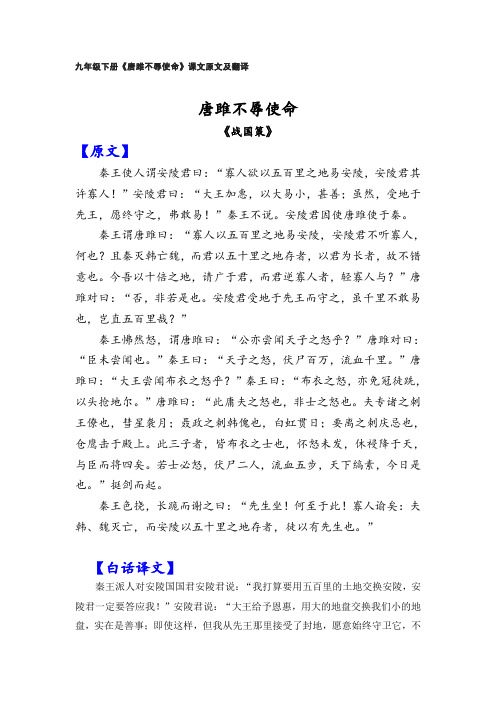
九年级下册《唐雎不辱使命》课文原文及翻译唐雎不辱使命《战国策》【原文】秦王使人谓安陵君曰:“寡人欲以五百里之地易安陵,安陵君其许寡人!”安陵君曰:“大王加惠,以大易小,甚善;虽然,受地于先王,愿终守之,弗敢易!”秦王不说。
安陵君因使唐雎使于秦。
秦王谓唐雎曰:“寡人以五百里之地易安陵,安陵君不听寡人,何也?且秦灭韩亡魏,而君以五十里之地存者,以君为长者,故不错意也。
今吾以十倍之地,请广于君,而君逆寡人者,轻寡人与?”唐雎对曰:“否,非若是也。
安陵君受地于先王而守之,虽千里不敢易也,岂直五百里哉?”秦王怫然怒,谓唐雎曰:“公亦尝闻天子之怒乎?”唐雎对曰:“臣未尝闻也。
”秦王曰:“天子之怒,伏尸百万,流血千里。
”唐雎曰:“大王尝闻布衣之怒乎?”秦王曰:“布衣之怒,亦免冠徒跣,以头抢地尔。
”唐雎曰:“此庸夫之怒也,非士之怒也。
夫专诸之刺王僚也,彗星袭月;聂政之刺韩傀也,白虹贯日;要离之刺庆忌也,仓鹰击于殿上。
此三子者,皆布衣之士也,怀怒未发,休祲降于天,与臣而将四矣。
若士必怒,伏尸二人,流血五步,天下缟素,今日是也。
”挺剑而起。
秦王色挠,长跪而谢之曰:“先生坐!何至于此!寡人谕矣:夫韩、魏灭亡,而安陵以五十里之地存者,徒以有先生也。
”【白话译文】秦王派人对安陵国国君安陵君说:“我打算要用五百里的土地交换安陵,安陵君一定要答应我!”安陵君说:“大王给予恩惠,用大的地盘交换我们小的地盘,实在是善事;即使这样,但我从先王那里接受了封地,愿意始终守卫它,不敢交换!”秦王知道后很不高兴。
因此安陵君就派遣唐雎出使秦国。
秦王对唐雎说:“我用五百里的土地交换安陵,安陵君却不听从我,这是为什么?况且秦国灭掉韩国、魏国,而安陵却凭借方圆五十里的土地幸存下来的原因,只是因为我把安陵君看作忠厚的长者,所以不在意。
现在我用安陵十倍的土地,让安陵君扩大自己的领土,但是他违背我的意愿,这是轻视我吗?”唐雎回答说:“不,并不是这样的。
牛津深圳版九年级上英语课文翻译(带翻译)
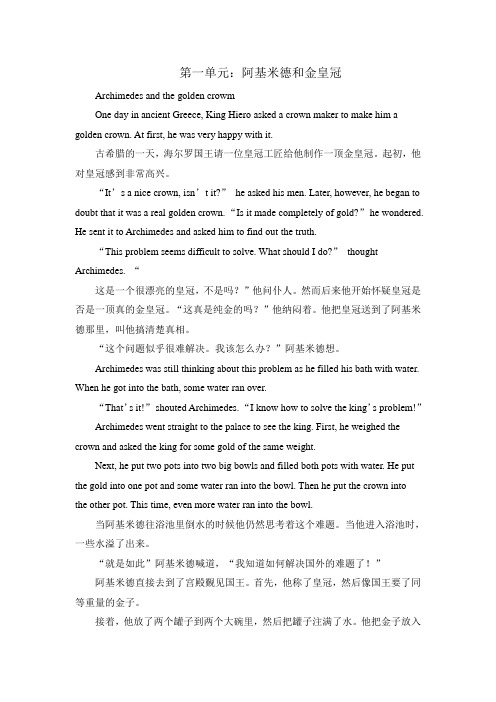
第一单元:阿基米德和金皇冠Archimedes and the golden crowmOne day in ancient Greece, King Hiero asked a crown maker to make him a golden crown. At first, he was very happy with it.古希腊的一天,海尔罗国王请一位皇冠工匠给他制作一顶金皇冠。
起初,他对皇冠感到非常高兴。
“It’s a nice crown, isn’t it?”he asked his men. Later, however, he began to doubt that it was a real golden crown. “Is it made completely of gold?”he wondered. He sent it to Archimedes and asked him to find out the truth.“This problem seems difficult to solve. What should I do?”thought Archimedes. “这是一个很漂亮的皇冠,不是吗?”他问仆人。
然而后来他开始怀疑皇冠是否是一顶真的金皇冠。
“这真是纯金的吗?”他纳闷着。
他把皇冠送到了阿基米德那里,叫他搞清楚真相。
“这个问题似乎很难解决。
我该怎么办?”阿基米德想。
Archimedes was still thinking about this problem as he filled his bath with water. When he got into the bath, some water ran over.“That’s it!”shouted Archimedes. “I know how to solve the king’s problem!”Archimedes went straight to the palace to see the king. First, he weighed the crown and asked the king for some gold of the same weight.Next, he put two pots into two big bowls and filled both pots with water. He put the gold into one pot and some water ran into the bowl. Then he put the crown into the other pot. This time, even more water ran into the bowl.当阿基米德往浴池里倒水的时候他仍然思考着这个难题。
深圳牛津版最新九年级(下)-课文-(带翻译)-word文档

初三(下)课文(翻译)1—3Unit 1 课文(翻译)Great explorations[eksplə'reɪʃ(ə)n]探索郑和下西洋The voyages ['vɒɪɪdʒ] 航行of Zheng He郑和是中国著名的探险家。
1405,他发起了中国七大航海史上的第一次。
这比哥伦布第一次航行发现美洲新大陆早了近一个世纪。
他的旅行是如此重要,人们至今仍然研究。
Zheng He was a famous Chinese explorer. In 1404, he set off出发from China on the first of seven great voyages ['vɒɪɪdʒ] 航行. This was nearly['nɪəlɪ]差不多a century ['sentʃʊrɪ]世纪before Christopher['krɪstəfə(r)] Columbus[kə'lʌmbəs] first set sail启航on his journey['dʒɜːnɪ]旅途 of discovery[dɪ'skʌv(ə)rɪ]发现 to America. His travels were so important that they are still studied today.郑和 1371 出生于云南,后来成为明朝永乐皇帝可信任的官员。
皇帝下令郑造访并探索中国以外的土地,他的任务是发展关系,建立与国外贸易通道。
Zheng He was born in Yunnan in 1371. He rose to 升迁;上升到become a trusted受信任的official [ə'fɪʃ(ə)l]官员of the Yongle Emperor['emp(ə)rə]皇帝of the Ming Dynasty['daɪnəsti]朝代. The emperor ordered Zheng He to visit and explore[ɪk'splɔː; ek-]探索the lands outside China. His task[tɑːsk]任务was to develop relations[dɪ'veləp]发展关系 and set up建立trade[treɪd]贸易 routes[ruːt]路线;航线with foreign countries.在短短几年内,他建造船舶组成了一支庞大的舰队,是当时世界上最大的。
外研版九年级英语下全册课文翻译
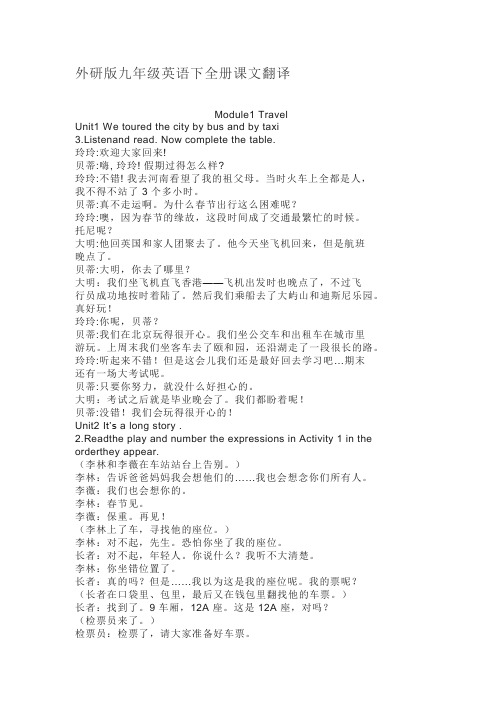
外研版九年级英语下全册课文翻译Module1 TravelUnit1 We toured the city by bus and by taxi3.Listenand read. Now complete the table.玲玲:欢迎大家回来!贝蒂:嗨, 玲玲! 假期过得怎么样?玲玲:不错! 我去河南看望了我的祖父母。
当时火车上全都是人,我不得不站了 3 个多小时。
贝蒂:真不走运啊。
为什么春节出行这么困难呢?玲玲:噢,因为春节的缘故,这段时间成了交通最繁忙的时候。
托尼呢?大明:他回英国和家人团聚去了。
他今天坐飞机回来,但是航班晚点了。
贝蒂:大明,你去了哪里?大明:我们坐飞机直飞香港——飞机出发时也晚点了,不过飞行员成功地按时着陆了。
然后我们乘船去了大屿山和迪斯尼乐园。
真好玩!玲玲:你呢,贝蒂?贝蒂:我们在北京玩得很开心。
我们坐公交车和出租车在城市里游玩。
上周末我们坐客车去了颐和园,还沿湖走了一段很长的路。
玲玲:听起来不错!但是这会儿我们还是最好回去学习吧…期末还有一场大考试呢。
贝蒂:只要你努力,就没什么好担心的。
大明:考试之后就是毕业晚会了。
我们都盼着呢!贝蒂:没错!我们会玩得很开心的!Unit2 It’s a long story .2.Readthe play and number the expressions in Activity 1 in the orderthey appear.(李林和李薇在车站站台上告别。
)李林:告诉爸爸妈妈我会想他们的……我也会想念你们所有人。
李薇:我们也会想你的。
李林:春节见。
李薇:保重。
再见!(李林上了车,寻找他的座位。
)李林:对不起,先生。
恐怕你坐了我的座位。
长者:对不起,年轻人。
你说什么?我听不大清楚。
李林:你坐错位置了。
长者:真的吗?但是……我以为这是我的座位呢。
我的票呢?(长者在口袋里、包里,最后又在钱包里翻找他的车票。
)长者:找到了。
9 车厢,12A 座。
九年级下册英语深圳牛津版Unit 4 Natural disasters 课文讲解

Module 2 Unit 4 Natural disasters课文讲解九年级下册英语深圳牛津版一、课文翻译The great flood大洪水Last week in Geography class, we learnt that if all the ice in the North and South Poles melted, sea level around the world would rise, and many cities would be flooded and disappear.上周,在地理课上,我们了解到,如果在北极和南极所有的冰都融化了,全球的海平面将上升,许多城市将被淹没、消失。
It started to worry me. What would happen if our city was badly flooded? Would anyone remain alive?这开始让我担心,如果我们的城市被严重地淹没,会发生什么事?会有人活着吗?Last night, I dreamt about a great flood:昨晚,我梦见了一个大洪水:It was nine o'clock in the morning. My bedroom floor was a pool of water.现在是早上九点钟。
我的卧室地板上有一滩水。
I looked out of the window. Water was everywhere. It covered roads, parks and small houses. 我看着窗外,到处都是水,淹没了道路、公园和小房子。
Large objects, such as coaches and boats, passed by my window. They were floating in the water.大型的物件,例如客车和船只,经过了我的窗户,它们是在漂在水中的。
深圳牛津版最新新九年级(下)课文(带翻译)

艿初三(下)芃课文(翻译)蚃1—3芈Unit 1 课文(翻译)莈Great explorations[ekspl?'re??(?)n]探索蚄郑和下西洋肁The voyages ['v???d?] 航行of Zheng He莁郑和是中国著名的探险家。
1405,他发起了中国七大航海史上的第一次。
这比哥伦布第一次航行发现美洲新大陆早了近一个世纪。
他的旅行是如此重要,人们至今仍然研究。
蒈Zheng He was a famous Chinese explorer. In 1404, he set off出发from China on the first of seven great voyages ['v???d?] 航行. This was nearly['n??l?]差不多 a century ['sent??r?]世纪before Christopher['kr?st?f?(r)] Columbus[k?'l?mb?s] first set sail启航on his journey['d???n?]旅途 of discovery[d?'sk?v(?)r?]发现 to America. His travels were so important that they are still studied today.肅郑和1371 出生于云南,后来成为明朝永乐皇帝可信任的官员。
皇帝下令郑造访并探索中国以外的土地,他的任务是发展关系,建立与国外贸易通道。
袃Zheng He was born in Yunnan in 1371. He rose to 升迁;上升到become a trusted 受信任的official [?'f??(?)l]官员 of the Yongle Emperor['emp(?)r?]皇帝 of the Ming Dynasty['da?n?sti]朝代. The emperor ordered Zheng He to visit and explore[?k'spl??; ek-]探索the lands outside China. His task[tɑ?sk]任务was to develop relations[d?'vel?p]发展关系 and set up建立trade[tre?d]贸易 routes[ru?t]路线;航线with foreign countries.肀在短短几年内,他建造船舶组成了一支庞大的舰队,是当时世界上最大的。
资料《Unit4课文原文与翻译(素材)译林版九年级英语下册》
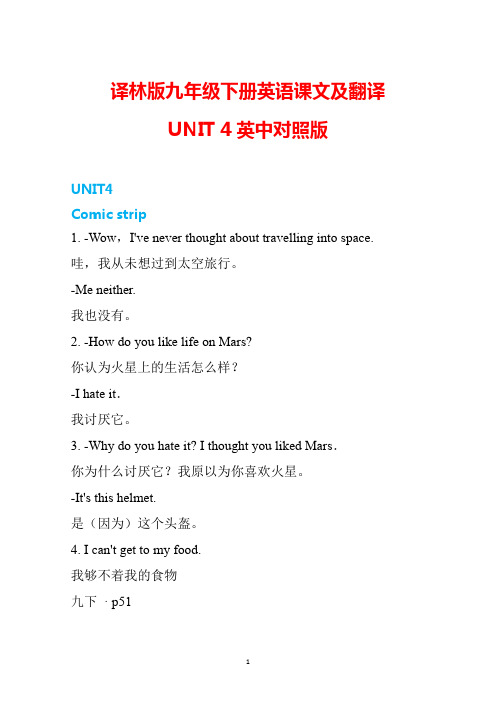
译林版九年级下册英语课文及翻译UNIT 4英中对照版UNIT4Comic strip1. -Wow,I've never thought about travelling into space.哇,我从未想过到太空旅行。
-Me neither.我也没有。
2. -How do you like life on Mars?你认为火星上的生活怎么样?-I hate it.我讨厌它。
3. -Why do you hate it? I thought you liked Mars.你为什么讨厌它?我原以为你喜欢火星。
-It's this helmet.是(因为)这个头盔。
4. I can't get to my food.我够不着我的食物九下· p51Welcome to the unitDaniel is talking to Amy about living on Mars. What would it be like? Work in pairs and discuss with your partner. Use the conversation below as a model.丹尼尔正在和埃米谈论火星上的生活。
它会是什么样子呢?结对练习,与同伴讨论。
用下面的对话作为示范。
Daniel:What would it be like to live on Mars?丹尼尔:住在火星上将会是什么样子呢?Amy:There's less gravity on Mars. We'd probably need to wear special boots.埃米:火星上重力小。
我们可能需要穿特殊的靴子。
Daniel:Yes. And we might need sleeping bags too.丹尼尔:是的。
我们可能也需要睡袋。
Amy:l agree. Also,there's no fruit or vegetables,so we would have to eat dried food.埃米:我赞同。
外研版九年级下册英语Module5Unit3课文翻译

外研版九年级下册英语Module5Unit3课文翻译翻译不仅是学习目的,也是测试目的,关于外研版九年级下册英语Module5 Unit3的课文翻译有哪些呢?接下来是店铺为大家带来的关于外研版九年级下册英语Module5 Unit3课文翻译,希望会给大家带来帮助。
外研版九年级下册英语Module5 Unit3课文翻译(一)Language practice语言练习I think it's going to rain.我认为要下雨了。
He fell over when he was running down the steps.当他正跑着下台阶时摔倒了。
He's hit his head and his leg hurts,I think he's broken his leg.他碰伤了他的头,并且他的腿疼。
我想他摔断腿了。
Who's missing?谁掉队了?Will I live?我会活着吗?Complete the conversation with the correct form of the words and expression in brackets.用括号中所给单词及短语的正确形式完成对话。
Lingling; Are you (1)______( plan) to join a summer camp, Daming? My friend(2)______(go) to one of those last year. He said he (3)______(get up) at6 am every day!玲玲:你正在(1)______计划参加夏令营吗,大明?我的朋友去年(2)______参加了一个夏令营。
他说他每天六点钟(3)______起床!Daming:Yes,l'm not very happy about getting up early,but I (4)_____(love) sports and often (5)______(do) exercise,so it'II beworth it.大明:是的,我对于这么早起床不太高兴,但是我(4)______热爱运动并经常(5)______进行锻炼,因此这将是值得的。
- 1、下载文档前请自行甄别文档内容的完整性,平台不提供额外的编辑、内容补充、找答案等附加服务。
- 2、"仅部分预览"的文档,不可在线预览部分如存在完整性等问题,可反馈申请退款(可完整预览的文档不适用该条件!)。
- 3、如文档侵犯您的权益,请联系客服反馈,我们会尽快为您处理(人工客服工作时间:9:00-18:30)。
初三(下)课文(翻译)1—3Unit 1 课文(翻译)Great explorations[eksplə'reɪʃ(ə)n]探索郑和下西洋The voyages ['vɒɪɪdʒ] 航行of Zheng He郑和是中国著名的探险家。
1405,他发起了中国七大航海史上的第一次。
这比哥伦布第一次航行发现美洲新大陆早了近一个世纪。
他的旅行是如此重要,人们至今仍然研究。
Zheng He was a famous Chinese explorer. In 1404, he set off出发from China on the first of seven great voyages ['vɒɪɪdʒ] 航行. This was nearly['nɪəlɪ]差不多a century ['sentʃʊrɪ]世纪before Christopher['krɪstəfə(r)] Columbus[kə'lʌmbəs] first set sail启航on his journey['dʒɜːnɪ]旅途 of discovery[dɪ'skʌv(ə)rɪ]发现 to America. His travels were so important that they are still studied today.郑和 1371 出生于云南,后来成为明朝永乐皇帝可信任的官员。
皇帝下令郑造访并探索中国以外的土地,他的任务是发展关系,建立与国外贸易通道。
Zheng He was born in Yunnan in 1371. He rose to 升迁;上升到become a trusted受信任的official [ə'fɪʃ(ə)l]官员of the Yongle Emperor['emp(ə)rə]皇帝of the Ming Dynasty['daɪnəsti]朝代. The emperor ordered Zheng He to visit and explore[ɪk'splɔː; ek-]探索the lands outside China. His task[tɑːsk]任务was to develop relations[dɪ'veləp]发展关系 and set up建立trade[treɪd]贸易 routes[ruːt]路线;航线with foreign countries.在短短几年内,他建造船舶组成了一支庞大的舰队,是当时世界上最大的。
这些船被称为宝船,它们大到足以承载25,000 人以及非常多的货物。
In a few years, he built a great fleet [fliːt]舰队of ships, the biggest in the world at that time. The ships were known as被称作treasure['treʒə]财宝 ships. They were big enough to carry 25,000 people as well as以及;还very large quantities of['kwɑntəti]大量的 goods货物.从1405 年至1433 年,郑和前后共进行了七次远游,并参观了东南亚,中东,甚至非洲的东海岸。
看上去没有哪能远到他们去不了的地方。
这些航行使得中国通过贵重物品如黄金、白银和丝绸进行贸易。
From 1405 to 1433, Zheng He went on seven trips and visited South-East Asia[ˈeɪʒə]亚洲, the Middle East and even the east coast[kəʊst]海岸 of Africa. It seemed that nowhere was too far for him to visit. These voyages['vɒɪɪdʒ]航行 allowed China to trade[treɪd]交易valuable['væljʊb(ə)l]贵重的goods like gold, silver['sɪlvə]银and silk[sɪlk]丝绸.每次航次结束,郑和返回时都带回在中国从没见过的很多东西,譬如来自非洲的长颈鹿。
除了发展贸易,航行也带动了文化和技术的交流,帮助了这些国家和地区的发展。
At the end of each voyage, Zheng He returned with many things that were seen in China for the first time, such as a giraffe[dʒə'rɑ:f]长颈鹿 from Africa['æfrɪkə]非洲. Besides[bɪ'saɪdz]除了developing trade发展贸易, the voyages also encouraged[ɪn'kʌrɪdʒ; en-]鼓励 the exchange[ɪks'tʃendʒ]交换 of cultures['kʌltʃə]文化and technologies[tek'nɒlədʒɪ]技术. They helped the development[dɪ'veləpm(ə)nt]发展of those countries and regions['riːdʒ(ə)n]地区.1433 年,郑和在他最后一次航行中去世了。
然而,他的航行成就是如此巨大,人们仍然铭记他,视他为开拓世界各地不同民族之间文化交流的先驱。
Zheng He died in 1433 during his last voyage['vɒɪɪdʒ]航行. However, his voyages were such a huge achievement [ə'tʃiːvm(ə)nt]成就that people still remember him as a pioneer[paɪə'nɪə]先锋in opening up开创cultural ['kʌltʃ(ə)r(ə)l] 文化的contacts['kɒntækt]接触;联系 between different peoples around the world.阅读下面的对话和对练吧。
注意蓝色的字词。
Read the conversation[kɒnvə'seɪʃ(ə)n]交谈;会话below[bɪ'ləʊ]在下面and practice['præktɪs]练习it in pairs两个两个地. Pay attention to注意the words in blue.嗨,Tony,我今天错过了历史课,你能告诉我学了什么吗?Doris: Hi, Tony. I missed错过the History lesson today. Can you tell me what you learnt, please?当然可以,我们学了郑和他的航行。
Tony: Of course. We learnt about Zheng He and his voyages.对不起,请再说一遍。
Doris: Sorry, could you repeat[rɪ'piːt]重复 that, please?好的,我们学了郑和他的航行,他用贵重商品,如黄金、白银和丝绸做贸易。
Tony: Sure. We learnt about Zheng He and his voyages. He traded[treɪd]交易valuable['væljʊb(ə)l]贵重的 goods货物like gold, silver['sɪlvə]银 and silk[sɪlk]丝绸.对不起,我没听清,你说他买卖黄金、白银和……?Doris: Sorry, I didn’t quite catch明白you. You said he traded gold, silver and…?丝绸,有一次,他甚至带回来一只长颈鹿!Tony: Silk. Once[wʌns]一次;曾经;一旦he even brought back带回 agiraffe[dʒə'rɑ:f]长颈鹿!马可·波罗Marco Polo在杭州西湖,有一个旅行者的小雕像,他的名字叫马可·波罗。
By West Lake[leɪk]湖, in the city of Hangzhou, there is a small statue['stætʃu]雕像 of a traveler. His name was Marco Polo.马可·波罗在威尼斯城长大,在现今的意大利。
1271 年,当他17 岁的时候,他跟随他的父亲和叔叔开始了他的亚洲旅程,并且在长达 24 年中一直没有回家。
他的旅程横穿亚洲,沿着丝绸之路,游遍整个中国。
他很喜欢杭州,以至于他将其形容为“世界上最好的城市”。
Marco Polo grew up长大in the city of Venice['venis]威尼斯, in present-day['prezənt'dei] 当今的Italy. In 1271, when he was 17 years old, he set off出发ona journey to Asia [ˈeɪʒə]亚洲with his father and uncle, and did not return home until24 years later. His travels took him across[ə'krɒs]横穿 Asia, along the Silk Road and throughout[θruː'aʊt]贯穿China. He loved Hangzhou so much that he described [dɪ'skraɪb]描述it as “the finest city in the world”.当马可·波罗最终回到威尼斯时,当时有一场战争,他被抓获了。
他在监狱里时,他把他的旅行故事告诉了另一个人。
这个人把这些故事写成了一本书,取名叫《马可·波罗游记》。
